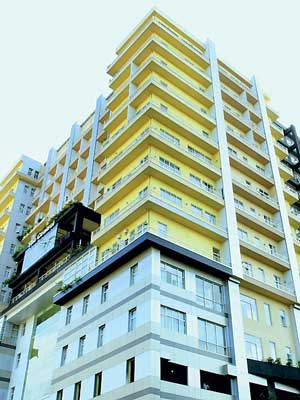Saturday Feb 28, 2026
Saturday Feb 28, 2026
Tuesday, 10 October 2017 00:00 - - {{hitsCtrl.values.hits}}
In Sri Lanka, today, not only are new cases of cancer identified every year, the disease is considered the third most common cause of death.
Blood cancers such as leukaemia, lymphoma, myeloma, and other blood disorders such as thalassemia are on the rise causing heart-breaking loss to families.
However, a bone marrow transplant can mean the difference between life and death for people with blood cancers and related disorders, especially children.
Asiri Hospital’s Bone Marrow Transplant Unit located at Asiri Central Hospital achieved a special milestone recently when it conducted the first successful stem cell transplant in the island by securing a matching unrelated donor through an international bone marrow donor registry.
“While our unit has been operational for about three years and have encountered many successes, we recently achieved a very special milestone of having successfully conducted the first bone marrow transplant in Sri Lanka using a donor from an international donor registry. The donor from the registry was a South Asian national. The patient, a 13-year-old child is now back at home, well and cured,” said Dr. Lallindra Gooneratne, Consultant Haematologist
In the recent procedure conducted by the Unit, a 13-year-old girl afflicted by thalassemia underwent an allogeneic transplant i.e. when stem cells are taken from a healthy donor. In this instance it was an unrelated (not a family member) but genetically matching donor. For allogeneic transplants, siblings and parents too are tested initially. However most patients do not have a genetically matched family donor.
The Unit also offers autologous transplants – in which the patient’s own stem cells are harvested prior to giving him/her high doses of chemotherapy and then re-infusing the patient with them. This is currently the standard of care for patients with myeloma.
Asiri’s Bone Marrow Transplant Unit shines as a beacon of hope providing all Sri Lankans in need of a bone marrow transplant, as their best or only promise of a cure. Treatment is available for all ages – to-date the Unit has treated its youngest patient at one year and eight months while the oldest was aged 66 years.
No longer are Sri Lankans compelled to travel overseas, mainly to India or Singapore to undergo the prohibitively expensive treatment. Instead, treatment that has been well out of reach for most citizens is now available at a significantly lower cost but with the same standards of treatment and care at Asiri’s Bone Marrow Transplant Unit. Additionally, if necessary the Unit will seek access to an unrelated but matching donor through an international registry.
“There are international donor registries where they have several thousands of donors registered and their genetic makeup has been listed. We can send our patient’s genetic reports to whatever country and they will check to see if there is a match. If there is match we can use those donor stem cells or bone marrow, to treat our patients in Sri Lanka,” explained Dr.Gooneratne
Additionally, close follow-up of stem cell transplanted patients is a central part of the treatment. Patients treated overseas have to bear the additional cost and disruption of travelling repeatedly.
“Follow up is very important – minimum is one year while the first three months are extremely crucial. They have to be monitored very carefully and are on medication for a period of about one year. The Unit also has a 24-hour hotline for patients to contact the nursing staff. Indicative that the Unit has met rigorous standards in every aspect of stem cell transplant, it has been accredited by the Joint Commission International (JCI). Therefore, we continue to maintain stringent quality checks on our documentation, systems, etc., ensuing quality patient care and safety standards,” said Dr. Gooneratne.
The unit incorporates the latest technology and techniques for infection control. Patients are shifted to specially designed HEPA (high-efficiency particulate air) filtered rooms with positive pressure to ensure the air within is filtered reducing the chances of infections, a high possibility in patients with a compromised immune status.
Staff at Asiri’s Bone Marrow Unit are specially trained in the management and care of patients. A specialised team of physicians and nurses received their initial training by an expert Italian team and continue to receive supplemental training.